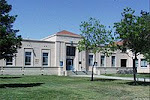Barack Obama gave a speech in Berlin earlier this week to 200,000 people (though I've seen estimates for the crowd as low as 20,000, but the lower estimate is not from the part of the media that gave lots of money to the Democratic party). This is a large excerpt from an article in the Weekly Standard about the speech by Andrew Ferguson.
Obama's "nothing" is sometimes interesting anyway; there are pointers in the vacuousness, as I saw when I read the full text on his campaign's website. He began the speech, as he often does, with a summary of his own life history, which elided into a history of the Cold War--mixing the two together, with his customary grandiosity. The history was nicely written up but not news. And the lesson he drew from it was, to be kind, idiosyncratic: The West's victory in the Cold War, he said, proved that "there is no challenge too great for a world that stands as one."
This will come as a surprise to anyone who lived through the Cold War or has even read about it. The thing about wars, even cold ones, is that the world doesn't stand as one; that's why there's a war. And in the Cold War the Soviet side was as united as the West; more so, probably. Left out of Obama's history was any mention of the ferocious demonstrations against the United States in the streets of Paris and West Berlin during the 1960s and 1980s, when American presidents were routinely depicted as priapic cowboys and psychopaths. Probably a fair number of the older members of Obama's audience had been hoisting those banners themselves 25 years ago.
So if "standing as one" didn't win the Cold War, what did? Obama didn't stop to answer, since his own reading of history seems to deny the premise of the question. Instead he hustled on to the present moment. Now, he said, "we are called upon again." To do what? Presumably to stand as one all over again, in the face of "new promise and new peril." Included in the latter are terrorism, global warming, and nuclear proliferation. But those perils aren't the worst of it. "The greatest danger of all is to allow new walls to divide us from one another."
The sentence is the heart of the speech and an instance of Obama's big weakness--his preference for the rhetorical flourish over a realistic account of things as they are. Most politicians share the weakness, and the preference has proved wildly attractive to Obama's supporters. But think it through: "New walls to divide us" is just a metaphor, a trope. A trope can't be the "greatest danger of all." A terrorist setting off a nuclear bomb in London--that's a danger. A revolution in Islamabad--that's a danger. A figure of speech is just a figure of speech.
And what will Obama have us do to avoid those nonmetaphorical dangers? He declined to get specific, aside from urging us to "answer the call." Floating along on a cloud of metaphor and generality allows Obama to do what he wants to do, in the Berlin speech and elsewhere. As a public figure he means to rise
It doesn't matter that human affairs never work out this way, no more in domestic politics than in foreign policy. The assumption that they do is what lends so many of Obama's utterances their greeting-card simplicity and appeal. The effect is almost soporific: "America cannot turn inward," he says. Check. "Now is the time to build new bridges." All set to go. "We must defeat terror." True dat. "Every nation in Europe must have the chance to choose its own tomorrow free from the shadows of yesterday." Roger. "We must help answer the call for a new dawn in the Middle East." Go ahead: Argue.
To pump a little vigor into his limp sentiments, Obama attached them to a hypnotic refrain. "This is the moment," he said in Berlin, repeatedly. But where's the urgency come from? What's the rush? In the long train of platitudes he suggested no discrete, definable policy that needed to be adopted urgently, beyond his call to unity, which isn't a policy but an aspiration. You get the idea that the urgency doesn't arise from an assessment of reality but from a rhetorical need. He's got to keep the folks on their toes somehow.
Obama couldn't come to Berlin and deliver a speech full of portent, as Reagan and Kennedy did before him, and as his publicists suggested he might. For all the talk about this being our time and us being the people, Obama shows no sign of really believing we live in portentous times. This is surely part of his appeal. It's not surprising that when he came to Berlin and said nothing at all, none of his admirers seemed disappointed. After eight years of overheated history, nothing comes as a relief.
Subscribe to:
Post Comments (Atom)





















No comments:
Post a Comment